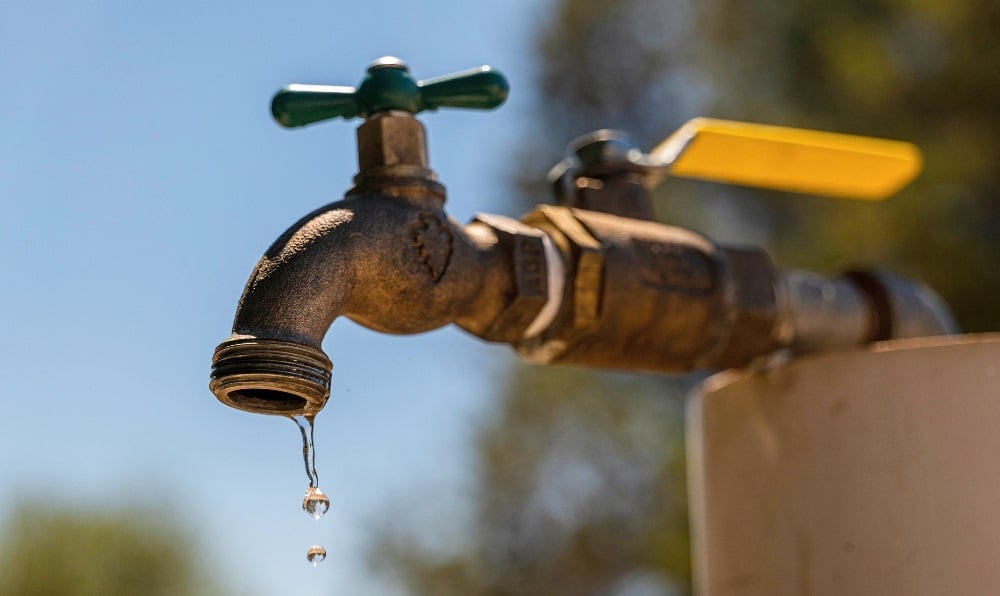Residents in Johannesburg are without water as the summer season begins. (David Paul Morris/Bloomberg/Getty Images)
- Johannesburg is facing severe water shortages, with reservoirs running low and many areas experiencing outages.
- The city loses 40% to 50% of its water due to leaks and other issues, and efforts to boost supply have not significantly improved the situation.
- Water entities are blaming the outages on high consumption.
Even though summer is still more than two months away, reservoirs in Johannesburg are already running out of water.
For the last two years, the city has run out of water in September due to “increased consumption” amid warm weather.
On Monday, residents of Carlswald, Roosevelt Park, Killarney, Hyde Park, and Illovo reported that they had been without water for up to six days.
According to Johannesburg Water, residents are consuming water faster than bulk water distributor Rand Water can deliver.
At a Rand Water imbizo on urgent water issues and potential solutions to secure water supply in the future, the utility said Johannesburg lost around 40% to 50% of its water due to leaks and other issues.
READ | Makhanda water, service delivery crisis: SAHRC gives municipality 14 days to intervene
The entity said it would prioritise essential infrastructure maintenance while working to expand capacity to meet rising demands.
It said the uptick in water demand in Gauteng was due to rapid population growth and the growing water demand during peak times. The infrastructure was also slow to recover, which led to interruptions in supply, it said.
On Monday, Johannesburg Water said it had reconfigured the Parktown 2, Dunkeld, and Berea reservoirs overnight to improve the water systems.
These systems supply vast areas in the city as follows:
- Parktown 2 Reservoir – Saxonwold, Hyde Park, Melrose, Dunkeld West, Parkview, Illovo, Greenside, Parktown, Parkwood, Birdhaven, Riviera, Killarney, Oaklands, Craighall, West Cliff, Birnam, Craighall Park, Rosebank, and Fairway;
- Dunkeld Reservoir – Hyde Park, Craighall, Parktown, Parkwood, Hyde Park, Dunkeld West, Blairgowrie, Oerder Park, Parkwood, Victory Park, Greenside, Hurlingham, Parkhurst, and Craighall Park; and
- Berea Reservoir – De Wetshof, Observatory, Oospoort, Bruma, Cyrildene, Bezuidenhoud Valley, Bertrams, Lorentzville, Judith’s Paarl, and Troyville.
It said there was a slight improvement at the Parktown 2 Reservoir and a “satisfactory” improvement at Berea Reservoir.
“However, the reservoirs are still low due to challenges in supply and increased consumption. The Dunkeld Reservoir also remains critically low,” it added.
Johannesburg Water said customers in the supply zone would experience poor pressure to no water – especially in high-lying areas – because all systems are low.
The entity said there was no estimated restoration time but that it would continue to implement configurations to help boost the system.
The South Hills Tower and the Klipfontein View water systems are also experiencing supply issues.
On Monday, Johannesburg Water said efforts to boost both systems did not yield significant improvements because of issues with bulk water supply at Rand Water and because water demand remained high.
It said the South Hills Tower remained critically low “with no pumping taking place at the tower”.
Areas affected include:
- Klipfontein View; and
- South Hills Tower – Risana, South Hills, Tulisa Park, Steeledale, Linmeyer, Oakdene, Rosettenville and Klipriviersberg Estate.
Johannesburg Water said it would also close the Erand 2 Reservoir inlet every two days between 12:00 and 18:00 “to allow for reconfiguration and balancing of the system” to boost the Grand Central Reservoir, which is struggling with low water levels.
Areas including Voma Valley, Crowthorne, Kyalami, Waterfall, Klipfontein View, and surrounding areas will be affected by poor pressure or no water.
Meanwhile, at the Rand Water imbizo on Friday, Rand Water group chief executive Sipho Mosai said the entity had surpassed its daily water abstraction licence allocation to supply municipalities.
The Department of Water and Sanitation allows Rand Water to abstract 4 384 million cubic litres daily from the Integrated Vaal River System. The entity has been abstracting between 4 642 and 5 036 million litres daily.
